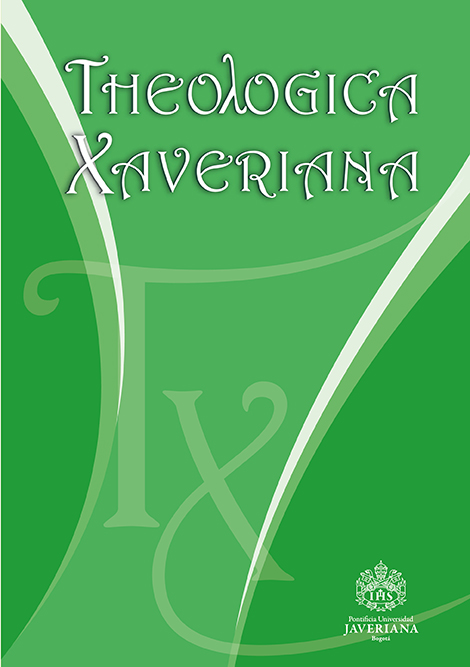Abstract
Encouraging hope is one of the greatest challenges in the current context. Circumstances seem to offer few reasons for a hopeful outlook and a constructive response to suffering. In this article we approach the biblical sources and show how the story of Judith provides us valid keys for dealing with suffering, fostering hope and offering believing and committed responses to reality. To this end, we begin by presenting one of the most striking characteristics of this biblical book and its purpose. The story plays with historical data to offer a panorama close to our concept of dystopia. The pretension it has with this is to become a warning for the readers. After this framework, we will go through the biblical narrative to present what generates suffering in history and how it is understood. The text offers two possible theological interpretations of suffering, but only one is considered appropriate. Adverse situations can be experienced as a sign of divine abandonment or as a test from God intended to enhance the courage of those affected. We will also analyze the response offered by the protagonist to this situation and, finally, what lessons and questions we can learn for today.
Alonso Schökel, Luiz y José Luis Sicre Díaz. Job. Comentario teológico y literario. Madrid: Cristiandad, 1983.
Angulo Ordorika, Ianire. “Tres mujeres bíblicas capaces de construir una identidad femenina alternativa”. Estudos feministas 30/1 (2022). Scielo, https://doi.org/10.1590/1806-9584-2022v30n174666
Boccaccini, Gabriele. “Tigranes the Great as ‘Nebuchadnezzar’ in the Book of Judith”. En A Pious Seductress. Studies in the Book of Judith, editado por Géza G. Xeravits, 55-69. Göttingen: De Gruyter, 2012.
Calduch-Benages, Nuria. “El motivo de la prueba en el libro de Ben Sira con especial referencia a Si 2,1-6”. En Pan de sensatez y agua de sabiduría. Estudios sobre el libro de Ben Sira, Nuria Calduch-Benages, 57-70. Estella (Navarra): Verbo Divino, 2019.
Doré, Daniel. El libro de Judit o la guerra y la fe. Estella (Navarra): Verbo Divino, 2006.
Efthimiadis-Keith, Helen. “Genealogy, Retribution and Identity: Re-interpreting the Cause of Suffering in the Book of Judith”. Old Testament Essays 27 (2014): 860-878.
Esler, Philip F. “Ludic History in the Book of Judith: The Reinvention of Israelite Identity?”. Biblical Interpretation 10 (2002): 107-143.
García Fernández, Marta. “Tipologías del miedo en la Sagrada Escritura”. Sal Terrae 98 (2010): 687-692.
Lang, Judith. “The Lord Who Crushes Wars. A Study on Judith 9:7; 16:2 and Exodus 15:3”. En A Pious Seductress. Studies in the Book of Judith, editado por Géza G. Xeravits, 179-187. Göttingen: De Gruyter, 2012.
Liverani, Mario. Relaciones internacionales en el Próximo Oriente antiguo, 1600-1100 a. C. Barcelona: Bellaterra, 2003.
Lohfink, Norbert. Violencia y pacifismo en el Antiguo Testamento. Bilbao: Desclée De Brouwer, 1990.
Malina, Bruce J. El mundo del Nuevo Testamento. Perspectivas desde la antropología cultural. Estella (Navarra): Verbo Divino, 1995.
Milne, Pamela J. “What Shall We Do With Judith? A Feminist Reassessment of a Biblical ‘Heroine’”. Semeia 62 (1993): 37-58.
Montero Orphanopoulos, Carolina. Vulnerabilidad: hacia una ética más humana. Madrid: Dykinson, 2022.
Plevnik, Joseph. “Honor/Shame”. En Biblical Social Values and Their Meaning. A Handbook, editado por John J. Pilch y Bruce J. Malina, 95-104. Peabody: Hendrickson, 1993.
Schöpflin, Karin. “Judith on Stage: The Dramatic Career of a Biblical Heroine”. En A Pious Seductress. Studies in the Book of Judith, editado por Géza G. Xeravits, 198-213. Göttingen: De Gruyter, 2012.
Schweitzer, Steven James. “Utopia and Utopian Literary Theory: Some Preliminary Observations”. En Utopia and Dystopia in Prophetic Literature, editado por Ehud Ben Zvi, 13-26. Göttingen: Vandenhoeck & Ruprecht, 2006.
Sicre, José Luis. Introducción al profetismo bíblico. Estella (Navarra): Verbo Divino, 2011.
Stiebert, Johanna. The Construction of Shame in the Hebrew Bible. The Prophetic Contribution. Sheffield: Sheffield Academic Press, 2002.
Tepedino, Ana María. “Espiritualidad de la esperanza: la experiencia de Dios en ‘tiempos difíciles’”. Theologica Xaveriana 154 (2005): 253-266. Vílchez, José. Tobías y Judit. Estella (Navarra): Verbo Divino, 2000.
Wojciechowski, Michael. “Moral Teaching of the Book of Judith”. En A Pious Seductress. Studies in the Book of Judith, editado por Géza G. Xeravits, 85-96. Göttingen: De Gruyter, 2012.
Xeravits, Géza G. “The Supplication of Judith (Judith 9,2-14)”. En A Pious Seductress. Studies in the Book of Judith, editado por Géza G. Xeravits, 161-178. Göttingen: De Gruyter, 2012.
Yee, Gale A. “By the Hand of a Woman: The Metaphor of the Woman Warrior in Judges 4”. Semeia 61 (1993): 99-132.

This work is licensed under a Creative Commons Attribution 4.0 International License.


